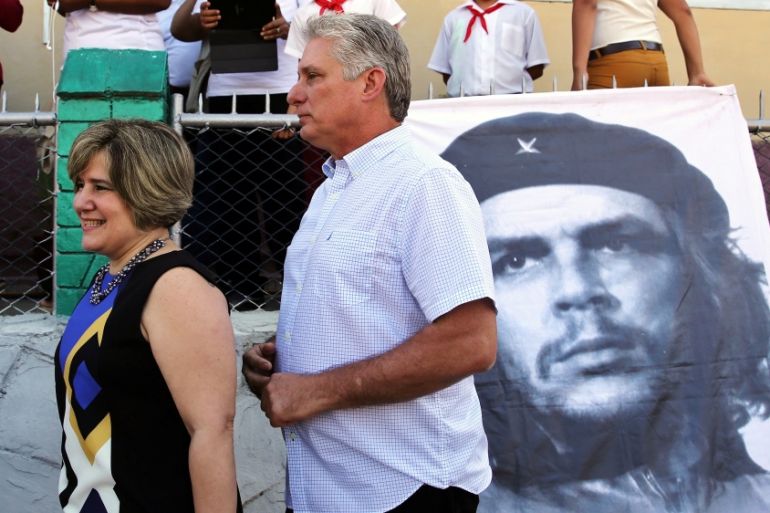Cuban President Miguel Diaz-Canel gives first speech in Assembly
Miguel Diaz-Canel’s election marks first time in nearly six decades the Communist country will not be led by a Castro.

The Cuban National Assembly has formally elected Miguel Diaz-Canel as the country’s new president.
The vote on Thursday marked the end of an era for Cuba, making Diaz-Canel the first person outside the Castro family to rule the country in 59 years.
“The mandate given by the people to this house is to give continuity to the Cuban revolution in a crucial historic moment,” said Diaz-Canel during his first speech as president at the National Assembly.
“What we’re seeing here which is fascinating, is a new chapter with the same text,” said Lucia Newman, Al Jazeera’s Latin America Editor, reporting from Havana.
Raul Castro, the previous president, stepped down after two five-year terms.
Raul is the brother of the late Fidel Castro, who overthrew dictator Fulgencio Batista in the 1959 revolution and led the country for decades.
“Most Cubans observers also know that with Raul Castro stepping aside, there wasn’t going to be a major change,” our correspondent said.
|
|
Diaz-Canel’s nomination as the head of the 31-member Council of State was officially confirmed on Thursday. He was the only candidate.
The Castro family had ruled the socialist nation since the 1959 revolution.
Castro will remain the head of the ruling Communist Party until 2021 and is expected to continue to play an important role in policy decisions.
“I think one of the reasons why Diaz-Canel was an obvious candidate was because he’s respected, he is clearly ideologically-sound,” Antoni Kapcia, a professor of Latin America History at the University of Nottingham, told Al Jazeera.
“The government is unlikely to do anything which is significantly against what they know Raul Castro to want.”
‘Continuity foretold’
Al Jazeera’s Newman said: “The Communist Party of Cuba is more important than the National Assembly or even the Council of State.
“They set the guidelines for the country and Raul Castro is going to remain as head of that all-powerful Communist Party. So certainly Diaz-Canel is not going to be able to run off to become the great reformer, even if he wanted to – and, from what we understand, that is not his position.
“This is a story of continuity foretold.”
In his speech, Diaz-Canel said: “There is no space here for a transition that ignores or destroys the legacy of so many years of struggle.”
|
|
The transfer of power comes at a precarious time in Cuba’s history. Cuban allies in Latin America have been voted out of government positions across the region in recent years.
A detente between the US and Cuba, longtime adversaries, has slowed after Donald Trump became president in 2017.
“Cuban foreign policy will remain unchanged and we reiterate that no one will be able to weaken the Revolution, nor make the Cuban people yield because Cuba does not make concessions against its sovereignty and independence” said Diaz-Canel.
“We will never give in to pressure or threats. The changes that are necessary will continue to be decided sovereignly by the Cuban people.
Limits of detente
Kapcia said: “The deterioration in relations has entirely come from the US point of view. The Cubans very clearly want proper relations with the US. They welcomed Obama.
“They also knew the limits of the Obama detente and they are cautious.
“But at the same it’s in their interest to have some kind of end to the embargo, to have normal relations and to avoid a hostility.”
Cuba facing economic difficulties after Raul, who succeeded his brother Fidel as president in 2008, initiated market-style reforms that were agreed to in 2011.
|
|
Though the reforms caused a boom in the Cuban economy, they have since slowed.
“Despite the errors and insufficiencies recognised in this plenary, the situation is more favourable than a few years ago,” Castro, 86, was quoted as saying by party newspaper Granma.
Political campaigning is outlawed in Cuba, so little is known about Diaz-Canel’s plans to navigate these challenges.
However, there is reason to believe the president will continue with liberalising social policies, given his past support for LGBT rights, expanded internet access and loosening government controls on media.
Still, Diaz-Canel is not known to support changing Cuba’s government from the one-party system in place since the revolution, a demand from anti-Castro politicians in the US.
According to Ted Piccone, a senior fellow at the Brookings Institution, the Trump administration will most probably “double down” on its “embrace of punitive regime change” in Cuba after Diaz-Canel assumes power.